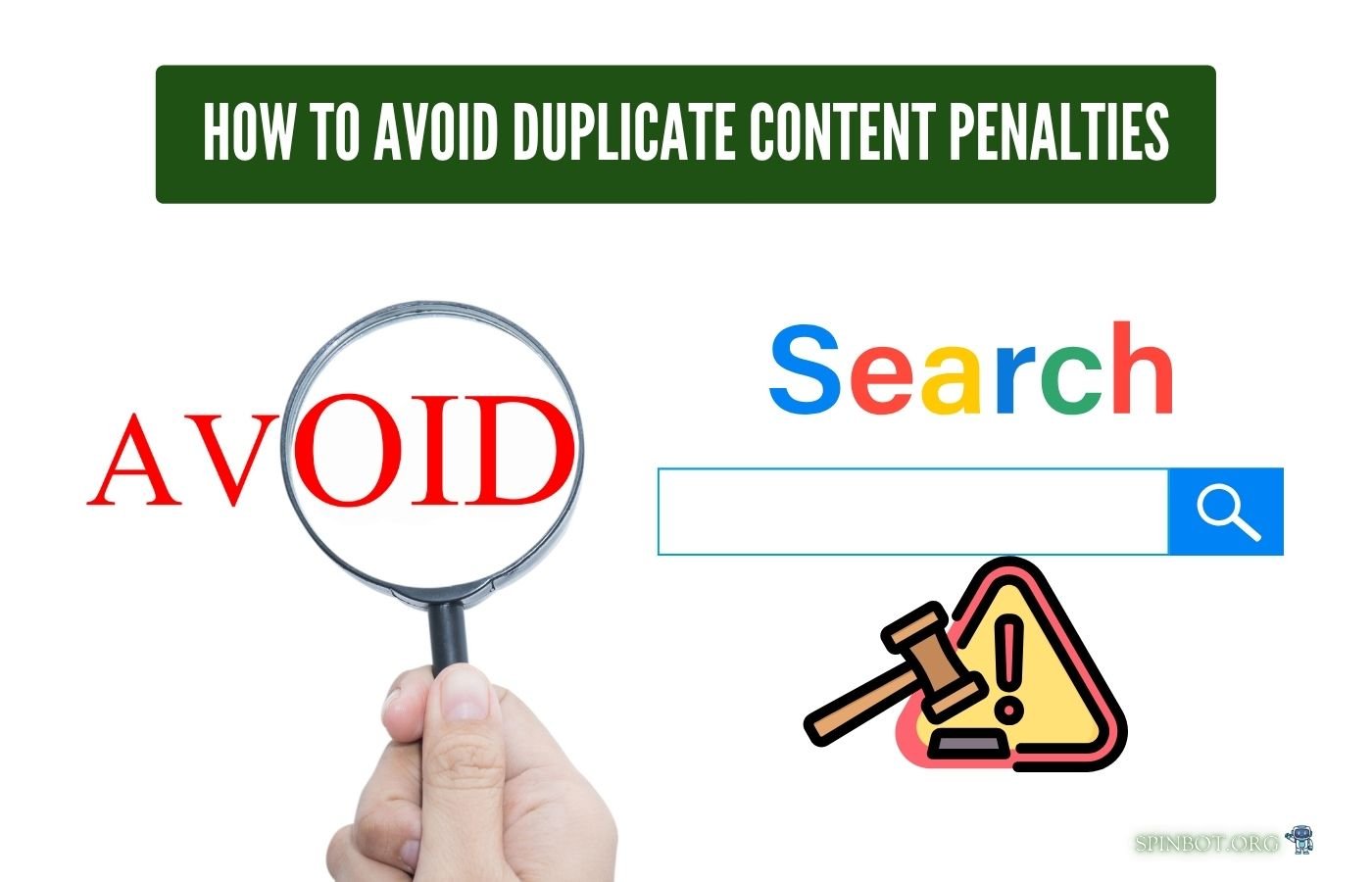Duplicate content penalties can significantly hurt your website’s SEO performance and affect your ranking on search engines like Google. If not managed properly, it can lead to lower visibility, reduced traffic, and lost revenue. In this article, we will explore how to avoid duplicate content penalties, why they happen, and provide actionable solutions to fix any issues related to duplicate content.
What is Duplicate Content?
Duplicate content refers to content that appears on the internet in more than one location, either on the same website or across different domains. It can appear as exact copies or near-identical copies of content, often caused by technical issues or content duplication strategies.
- Duplicate content meaning: When content is duplicated, it confuses search engines like Google, which may struggle to determine which version of the content should be ranked.
- Duplicate content SEO: Duplicate content poses significant challenges for SEO because search engines may penalize pages that have content that is too similar to other pages. This can affect your site’s rankings and organic reach.
Why is Duplicate Content Bad for SEO?
Duplicate content can result in several negative consequences for SEO:
- Search Engine Confusion: When Google encounters duplicate content, it may not know which version to rank higher. As a result, neither version gets the ranking it deserves.
- Dilution of Link Equity: Backlinks pointing to duplicate content will spread the link equity across multiple pages, diminishing the potential impact of those links.
- Negative User Experience: When users land on a page with duplicate content, they may not find the value they’re looking for, which leads to a higher bounce rate and lower engagement.
The Impact of Duplicate Content on SEO
Duplicate content penalties are implemented to protect the integrity of search results and ensure users are provided with the most relevant and unique content. When duplicate content is detected, search engines may:
- Lower Rankings: Google may choose to display the original content and suppress other duplicates in search results.
- Impose a Duplicate Content Penalty: If the content duplication is deemed intentional or spammy, search engines may impose penalties that significantly affect a website’s traffic and visibility.
- Index Multiple Versions: Google can index different versions of content, but this doesn’t help SEO. In fact, it wastes the crawl budget.
How to Avoid Duplicate Content Penalties
To avoid duplicate content penalties and protect your SEO ranking, follow these proven strategies:
Use Canonical Tags to Specify the Original Source
A canonical tag (rel=”canonical”) helps search engines understand which version of a page is the original. By implementing this tag, you signal to Google that multiple versions of content exist but that the tagged page should be considered the primary one.
- How to avoid duplication: For pages with similar content, use canonical tags to indicate which page should be ranked.
301 Redirects to Consolidate Duplicate URLs
If you have multiple pages with similar or duplicate content, use 301 redirects to point users and search engines to a single, authoritative version. This helps consolidate link equity and ensures that your website’s traffic and rankings aren’t divided.
- How to solve a duplicate content issue: By redirecting duplicate pages to their original versions, you minimize the chances of duplicate content issues and avoid penalties.
Avoid Content Scraping
Content scraping involves copying text from other websites and posting it on your own site. This practice can severely damage your website’s SEO, leading to a duplicate content penalty. To prevent scraping, focus on creating original and valuable content.
- Duplicate content Google: Google’s algorithms are designed to detect content scraping, and they penalize websites that engage in this unethical practice.
Manage URL Parameters Properly
Sometimes, the same content is accessible via different URLs due to parameters in the web address. For example, a product page with different sorting parameters could result in duplicate content. To avoid this, manage URL parameters through Google Search Console and ensure that search engines index only one version of the page.
- How to minimize duplicate content: Implement URL parameter handling and set parameters for canonicalization to prevent duplicate content from being indexed.
Block Duplicate Pages with Robots.txt
Another useful technique for managing duplicate content is to block certain pages from being indexed by search engines using a robots.txt file. This is especially useful when dealing with content that you don’t want search engines to index, such as duplicate filter pages or login pages.
- Duplicate content checker: Use robots.txt to prevent duplicate pages from appearing in search engine results.
Focus on Content Uniqueness and Quality
The best way to prevent duplicate content is to avoid it in the first place. Always create original, high-quality content that provides value to your audience. This not only helps your SEO but also builds trust and authority in your niche.
- How to fix duplicate content: Ensure your content is unique and valuable. This way, search engines will have no reason to treat your pages as duplicates.
Use “Noindex, Nofollow” Tags for Unwanted Duplicate Pages
When you have content that is necessary for your website but isn’t intended to be indexed (such as thank you pages or filters), use “noindex, nofollow” meta tags to prevent search engines from indexing them.
- How would you minimize duplicate content? By applying noindex, nofollow to these types of pages, you prevent search engines from considering them duplicates.
Handle Syndicated Content with Care
Syndicating content can result in duplicate content across different domains. To handle syndicated content, always use the rel=”canonical” tag to point to the original source of the content.
- Duplicate content on different domains: Using canonical tags for syndicated content ensures that search engines give credit to the original publisher.
Regularly Audit Your Website for Duplicate Content
It’s crucial to perform regular audits to identify and resolve duplicate content issues. Tools like Screaming Frog, Copyscape, and Ahrefs can help detect duplicate content across your site and other domains.
- Duplicate content SEO: Regular audits help ensure that any potential duplicate content issues are caught early, before they can affect your SEO.
How to Solve Duplicate Content Issues
If you’ve already been affected by duplicate content penalties, don’t worry; there are ways to recover:
- Fix the Duplicate Content: Use canonical tags, 301 redirects, and other techniques to resolve the duplicate content issue.
- Request Reconsideration: If you believe your site has been unfairly penalized, you can request a reconsideration review from Google after fixing the issues.
- Monitor and Track Results: After addressing duplicate content, monitor your website’s performance and rankings to see if there’s an improvement.
Common Duplicate Content Issues and How to Fix Them
| Duplicate Content Issue | Solution |
|---|---|
| Multiple versions of the same page | Use 301 redirects or canonical tags. |
| Scraped or copied content from other sites | Create original content and avoid plagiarism. |
| Duplicate content due to URL parameters | Use proper URL management and canonical tags. |
| Syndicated content without proper attribution | Use canonical tags or rewrite content. |
Tools to Detect and Monitor Duplicate Content
To avoid penalties and resolve duplicate content issues efficiently, use these tools:
- Copyscape: Helps detect content duplication across the web.
- Screaming Frog: Crawls your website to identify duplicate content.
- Google Search Console: Allows you to monitor indexed pages and resolve duplicate content.
- Ahrefs: Detects duplicate content issues and provides actionable insights.
Conclusion
Duplicate content penalties can severely damage your SEO efforts, but they can be easily avoided with the right strategies. By using canonical tags, managing URL parameters, avoiding content scraping, and focusing on unique content creation, you can protect your website from penalties. Regular audits and the use of SEO tools will help you maintain a clean and optimized site. Implement these strategies to ensure that your content remains original and your website continues to perform well in search engine rankings.
Now that you know how to avoid duplicate content penalties, it’s time to put these strategies into practice and boost your SEO efforts.

Academic editor turned AI copy pro, Sarah-Jane fuses research precision with smart storytelling. Her insights build trust, spark ideas, and elevate every word with real-world writing experience.

